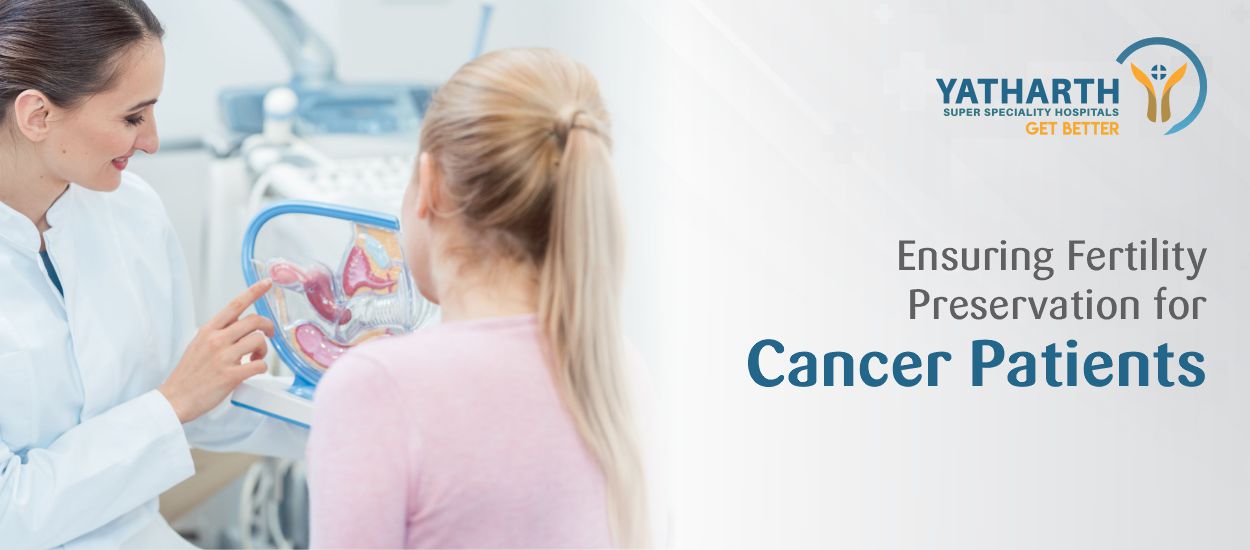Overview
Fertility can be impacted in a big way by cancer treatment. Before beginning this treatment, you must understand how it could affect your ability to bear a child. You must also know the steps to preserve your fertility before undergoing any cancer treatment.
The effects of cancer treatment on fertility could be temporary or permanent. The chances of your fertility being impacted will hinge on the type of cancer and its current stage, the cancer treatment used and your age when the treatment begins.
Various cancer treatments that could affect fertility include:
- Surgery: Surgical removal of the uterus, ovaries or testicles could harm fertility.
- Chemotherapy: The effects of chemotherapy will depend on the drug used and its dose. Compared to older women, young ones receiving chemo will be less likely to turn infertile.
- Radiation: More than chemo, radiation can impact fertility, which will depend on the location, size of the radiation field and the administered dose. High doses of radiation may destroy some or all eggs in the ovaries.
- Other cancer drugs: Hormone therapies that treat specific cancers, including breast cancer, may affect fertility. However, these effects are usually reversible. After treatment ends, fertility could be restored.
Discussing Fertility Preservation with Your Doctor
To undergo cancer treatment and wish to safeguard your fertility, speak to the oncologist and a fertility specialist at the earliest. A fertility specialist will advise you about the options and clear doubts during your treatment.
A single cancer treatment session can damage your fertility. In the case of women, some ways to preserve fertility are generally done during specific phases of their menstrual cycle. Check if cancer treatment must be delayed so fertility preservation steps can be undertaken.
How Women can Preserve Fertility before Cancer Therapy
Several options for fertility preservation are available for women who will take cancer treatment such as:
- Embryo cryopreservation: This requires harvesting, fertilizing and freezing eggs to be implanted in future. Embryos survive the process of freezing and thawing up to 90% of the time.
- Egg freezing: Here, the woman’s unfertilized eggs will be harvested and frozen. Human eggs can’t survive freezing in the same way as human embryos.
- Radiation shielding: In this, small lead shields will be placed over the ovaries, reducing their level of radiation exposure.
- Ovarian transposition: The ovaries will be surgically repositioned in the pelvis keeping them outside the radiation field when the pelvic region is targeted with radiation. But due to scatter radiation, protection of the ovaries isn’t always assured. After the treatment, the ovaries may again require repositioning for conception.
How Men can Safeguard Fertility
Men can also opt for preventive steps to preserve fertility before taking cancer treatment through:
- Sperm cryopreservation: In this procedure, sperm is frozen and stored at a sperm bank or fertility clinic to be used in future. The frozen samples can be stored for many years. Storage of sperm is always done before starting cancer treatment since this can impact the quality and quantity of sperm produced.
- Radiation shielding: Herein, small lead shields will be used to cover the testicles, lowering their level of radiation exposure.
How Parents Can Preserve the Fertility of a Child with Cancer
If your child with cancer has begun puberty, fertility could be preserved via options such as oocyte or sperm cryopreservation.
- For girls needing to have cancer treatment before puberty, ovarian tissue cryopreservation is an option. In this method, the ovarian tissue is removed surgically and frozen, which can be thawed later and re-implanted when required.
- For boys who undergo cancer treatment before puberty, one way to preserve fertility is by surgically removing and freezing their testicular tissue.
Some Important Questions
Questions may arise about whether fertility preservation can hinder successful cancer treatment or inflate the threat of recurring cancer. At present, no evidence indicates that the present fertility preservation means could directly affect the success of cancer therapies. Nonetheless, the overall success of your treatment may be compromised if surgery or chemotherapy is delayed in favour of fertility preservation.
There is no evidence of enhanced risk of cancer recurrence linked to most means of fertility preservation. However, some concern remains that by re-implanting frozen tissue one runs the risk of reintroducing cancerous cells, although this depends on the type and stage of the specific cancer.
Another worry is whether cancer treatment can inflate the threat of health issues in children who were conceived after this. If a baby is not exposed in utero to cancer treatment, there appears to be no higher risk of congenital conditions or allied health problems for children conceived thereafter. But if cancer treatment that affects the heart or lung functions is given or if radiation is administered in the pelvic area, the woman must consult a specialist before pregnancy to check for the possibility of related complications.
The other major concern is about determining the best fertility preservation option for oneself. In such cases, the oncologist will consider the type of cancer in question, the treatment plan and the quantum of time available before treatment is started to help decide what the best approach is in this case.
Other Issues You May Need to Know
Remember that everyone’s right to preserve fertility remains the same irrespective of the person’s sexual orientation or gender identity and whether the individual is married or not. Before undergoing fertility preservation, you will be informed about what the procedure involves, its likely risks and benefits and the options for becoming a parent in future.
If you choose fertility preservation, a blood test will be taken to check for HIV, hepatitis B and C or other infections. Though the results won’t affect your ability to have fertility preservation, it will help the clinic store your tissue or cells safely.
Although any cancer diagnosis and treatment can seem overwhelming, when it comes to fertility you must remember that there are varied options to preserve the same. Yet, never delay in procuring information regarding fertility preservation methods before your treatment begins since this will be most helpful in making an informed choice. Visiting the best fertility preservation clinic or hospital in your region will help ensure the best outcomes before you begin cancer therapy.
















